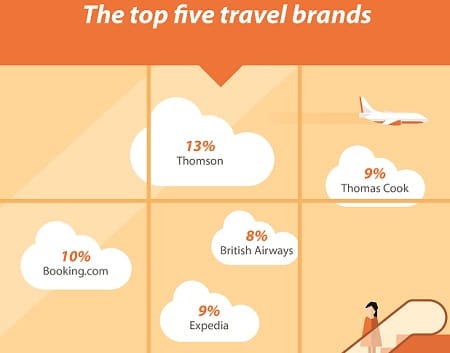
The DMA asked a panel of travel consumers their thoughts on the travel brands they prefer, from booking to flights to hotels.
According to the research, conducted by the DMA and Foresight Factory, with partners Emarsys, Epsilon, Feefo and Wiraya, when asked about their favourite travel brands, consumers mentioned over 70 different organisations.
The top 5 brands named were:
- Thomson – 13%
- Booking.com – 10%
- Thomas Cook – 9%
- Expedia – 9%
- British Airways – 8%
Scott Logie, Chair of the DMA Customer Engagement Committee and MD at REaD Group Insight, said: “It’s particularly interesting to see the range of options favoured by customers. When people were asked to name their favourite companies to use for travel, the sheer volume of travel brands mentioned was somewhat surprising. From household names to local travel agents, as well as the new online intermediaries. As individuals we want choice, but we also want to ensure our holidays are hassle free, so we go with companies we trust – even if that is the small local travel agent.”
New analysis from the DMA’s Customer Engagement: Travel research highlights the top travel brands and how they fit into one of two groups – either engaging emotionally or functionally with their consumers. ‘Functional’ brands include Booking.com, Expedia, Trivago and Easyjet, while those with an ‘Emotional’ connection were Thomson, Thomas Cook and British Airways.
The research also found that each travel brand uses a signature mix of functional and emotional methods to engage their audience. ‘Functional’ brands focus on delivering value for the individual, offering consumers the best value for money by giving good service at low prices. While they might not be the most convenient to book with, these brands deal with issues efficiently to ensure a smooth holiday experience. Furthermore, they reflect the personality of their consumers to make them feel unique and special.
Examining the way these ‘Functional’ brands specifically – and saw the areas where they win support compared to others. Against the average favourite brand, functional brands score highly on their ability to deliver lower prices (+24%), good service (+10%), reflecting consumer personality (+10%) and dealing with issues (+5%).
Meanwhile, ‘Emotional’ brands focus more on the emotional, and the collective holiday experience. They are most popular with families, and maintain an emotional connection to their consumers by being helpful, friendly and welcoming – despite not really reflecting the personalities of their individual consumers. They are not the cheapest, but foster this emotional connection with a good functional mix of discounts and high convenience.
Comparing these ‘Emotional’ brands to the average favourite brands, they scored higher with consumers on giving them offers (+14.4%), convenience (+6.0%), tailored deals (5.5%) and consumers simply loving them (+5.0%).
Rachel Aldighieri, MD at the DMA, said: “Holiday travel is both an exciting and stressful experience, with the chance for distrust and caution to arise in the customer’s mind. Brands that can empathise with customers’ needs at whatever stage of their holiday journey and create communications that reflect their needs will have the potential to build stronger relationships in the long run.”
Ultimately, travel is often an emotional experience and, for many, a passion that means customers connect with the brands they travel with. Our analysis shows over 70 different brands named as ‘favourites’ by customers – but five dominant names resonate.
Successful travel brands fit into two categories of customer engagement approach: functional or emotional. But a universal truth for all travel brands is the importance of connecting on a personal and emotional level in order to build long-term relationships, then underpin this experience with quality service and appealing prices.
View the infographic below:

To read more about the DMA’s Customer Engagement research into the Travel sector, including the full report, visit: https://dma.org.uk/customer-engagement
